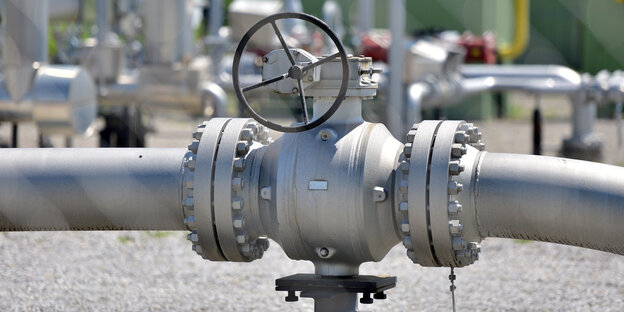Despite the war against Ukraine, Austria continues to obtain most of its natural gas from Russia. Gazprom contracts make exit difficult.

Here comes gas from Russia: gas storage in Haidach, Austria Photo: Spitzi-Foto/imago
VIENNA taz | Even two years after the start of full-scale war in Ukraine, Austria is taking few steps to withdraw from Russian gas. Russia's share of all imported natural gas was 98 percent last December. Calculated for the full year 2023, Russia's share was about two-thirds, the same as in 2022. For comparison, the EU as a whole only imports just under 15 percent of its gas from Russia, according to a calculation by the Vienna think tank. NEOS Laboratory.
Even if the Minister of Green Energy, Leonore Gewessler, were to call a press conference in the short term on new steps in view of the new figures: the balance is shameful and there is no end in sight. Apart from Hungary, no other EU country is so dependent on Russian gas.
This will continue to be the case in the medium term. With an exit in 2027, the goal of the ÖVP-Greens federal government was not very ambitious from the beginning. The government says dependency has increased for decades and a faster exit is not possible. While Germany, the Czech Republic and Italy reduced their imports to almost zero, Austria continues to send an average of 300 million euros to Russia each month. And this despite the fact that alternative gas capacities have already been achieved, for example from Italy and Germany. According to Gewessler, the fact that this has not been resorted to now is due to a “market failure.” His ministry now wants to develop state obligations for energy companies.
But even a complete elimination by 2027 is not set in stone. This is also due to a contract between Austria's most important energy company, OMV, and the Russian Gazprom, with which Austria is linked to Russia until 2040. The signing took place in a ceremonious manner and in the presence of the then chancellor Sebastian Kurz and of Russian President Vladimir Putin. Such a long period is absolutely unusual, experts say. Unnecessary, because the old delivery contract would have lasted until the end of 2027 anyway.
The contract between Gazprom and OMV is secret
And the new one, the OMV and the government argued, cannot end prematurely. It is a “take or pay” contract. In any case, you will have to pay for the gas you order, whether you use it or not. No further information is available because OMV keeps the contract strictly secret. According to its own data, not even the Government knows the content of the contract, although the Republic is the largest shareholder of OMV with 31.5 percent and, therefore, is also part of the supervisory board.
Therefore, it is questionable on what basis the government decides. In any case, Gewessler stated once again that his ministry wanted to examine a way out and, if possible, implement it. Why this hasn't been done a long time ago remains an open question. The lack of urgency is probably due to the business-friendly coalition partner ÖVP: Russian gas flows reliably and cheaply, and apparently it should stay that way.
Things were different, for example, when Russia arbitrarily reduced delivery quantities in 2022 and energy costs soared. Experts claim that Gazprom itself has breached its contract. If so, OMV could invoke it before an arbitration court.
Some may also speculate that a force majeure exit will soon be possible. At the beginning of January 2025, the current gas transit contract between Ukraine and Russia will end and, with it, the supply to Austria. An extension is uncertain; There have been contradictory statements from Ukraine. On the one hand, it is understandable that kyiv wants to put pressure on Vienna, but on the other, it does not want to alienate any allies.